Importance of Problem Solving Skills in the Workplace
Problem-solving skills hold a greater magnitude especially at the workplace than anywhere else due to the ill-structured and complex nature of workplace tasks.
A report published by the National Association of Colleges and Employers suggests that about 86% of employers look for problem-solving skills on student resumes and 60% of employers seek evidence of problem-solving skills when evaluating candidates.
It is hence a critical skill that is indispensable to solving complex and simple problems regardless of your role and position in the organization.

What is Problem Solving?
Problem-solving skill is the ability to solve problems through diverse and difficult situations and conditions. They do not just reflect your potential to gather information, process it, and come up with suitable solutions but also the ability to find and curate problems of high impact.
These skills to a great degree are considered “transversal” allowing the transfer of knowledge from learned theoretical mediums like books or other sources to practical real-world environments such as work.
Why Problem Solving is Crucial in the Workplace?
The ability to solve problems effectively is one of the most valuable skills an employee can possess. Whether it’s addressing unexpected challenges, improving processes, or resolving conflicts within a team, problem-solving impacts nearly every aspect of a business.
1. Workplace Problems Are Complex and Dynamic
Unlike personal or academic issues, workplace problems often involve a greater degree of complexity. This is because they require input from multiple people, span across various departments, and involve specialized knowledge.
The unpredictability of these problems arises from the fact that businesses operate in ever-changing environments, influenced by technology, market conditions, and human factors. A single workplace issue can impact productivity, employee morale, or even customer satisfaction, making effective problem-solving a critical skill for business success.
2. Enhances Productivity and Efficiency
Employees who excel in problem-solving contribute directly to the efficiency of their teams and the organization as a whole. Rather than being stuck in a cycle of trial and error, these employees can quickly analyze situations, identify the root causes, and implement practical solutions.
By doing so, they save time and resources, reduce delays, and ensure that workflows remain uninterrupted. For businesses operating in competitive markets, these productivity gains can translate into significant cost savings and a faster time-to-market for products or services.
3. Drives Innovation
Problem-solving skills foster innovation, which is essential for businesses looking to stay ahead in a competitive market. Employees who are good at problem-solving don’t just fix issues—they also explore alternative methods and strategies that could lead to improvements in current processes.
When teams are encouraged to look for creative solutions rather than just standard fixes, they push boundaries, creating new products, refining customer experiences, or enhancing operational efficiency. This innovation mindset helps companies stay relevant and thrive.
4. Conflict Resolution and Relationship Management
Workplaces are inherently social, and conflicts—whether between team members, departments, or clients—are inevitable. Employees with sharp problem-solving skills are better equipped to address conflicts without escalating them.
Instead of allowing disagreements to fester, they can approach issues with a calm, analytical mindset, addressing concerns and proposing solutions that satisfy all parties. Effective problem-solving in these scenarios leads to better working relationships, higher team morale, and an overall more cohesive work environment.
5. Boosts Employee and Team Performance
Top-level managers and leaders who possess strong problem-solving abilities play a pivotal role in shaping the overall performance of their teams. Their skills allow them to identify strengths and weaknesses within their teams, delegate tasks more effectively, and ensure that each member is working to their full potential.
By recognizing where inefficiencies lie and taking the necessary steps to address them, these leaders help their teams perform at their best, ultimately benefiting the organization as a whole.
6. Adaptability in Unpredictable Situations
One of the key attributes of a great problem-solver is adaptability. In today’s fast-paced work environment, unexpected challenges are inevitable.
Whether it’s a sudden shift in customer demands, a breakdown in communication, or a supply chain disruption, an adaptable problem-solver can think on their feet and navigate through the uncertainty. Their ability to assess the situation, weigh options, and implement solutions quickly minimizes disruption and keeps the business moving forward.
7. Long-Term Impact on Career Growth
Problem-solving skills are highly sought after in leadership and management roles. Organizations recognize that individuals who excel in this area are more likely to handle the responsibilities that come with decision-making and strategy implementation.
As such, employees who demonstrate strong problem-solving abilities are more likely to be promoted, given greater responsibilities, and trusted with critical projects. This long-term career growth also benefits the organization, as they cultivate leaders who can drive innovation and strategic thinking.
8. Alignment with Organizational Goals
Problem-solving isn’t just about addressing immediate issues—it also plays a crucial role in aligning day-to-day tasks with long-term organizational goals. Effective problem-solvers are capable of connecting the dots between the problem at hand and the larger picture.
This ensures that any decisions made contribute to the company’s overall strategy, whether that’s reducing operational costs, increasing market share, or improving customer satisfaction.
Types of Problem Solving Skills
One of the core elements of problem-solving is logical reasoning. When devising a solution to any problem, it is important to make sure that it does not defy rationality, and is feasible and relevant to the problem being faced. These factors are crucial to outlining the different forms of problem-solving. Here are some different forms of problem-solving skills.
1) Critical Thinking:
Critical thinking is the most popularly known form of problem-solving. Critical thinking involves analyzing problems, breaking down their cause-and-effect relationships, and evaluating and designing the most suitable and pragmatic solution. It emphasizes forming interpretations and using reliable sources to examine information.
E.g. If a product manager is required to add a new and innovative product line to meet the company’s need to diversify, then he must devise mechanisms to examine the possible demand for the product in the market, break down why or why not the product would or wouldn’t work, evaluate and discover solutions that would give their product an edge over the competitors in the market by gathering and studying information and thereby creating an execution plan.
👉 Check out: Assess candidate's critical thinking skills
2) Communication:
Communication is a vital problem-solving skill in any industry or job role. In the problem-solving realm communication refers to the ability to articulate information, problems, and solutions clearly and legibly. Good communication involves appropriate usage of tone, style, language, and medium that greatly impact business operations if misunderstood or misinterpreted. Employees that communicate problems better, create an environment that fosters openness, inclusivity, and diversity.
E.g. Most businesses in the modern world regularly go through tech upgrades, these may include the addition of a new feature to the company application or other software updates. A collaborative approach becomes necessary during such transformations. When the tech team decides to add a new feature, they also naturally rely on the marketing team to promote the app’s new accessibility upgrade.
This cross-functionality marketing team demands the tech team to simplify and communicate complex tech jargon to the marketing team for them to design an appropriate and compelling marketing plan.
👉 Check out: Assess candidate's english communication skills
3) Creative Problem-Solving:
Creative problem-solving refers to the process of decoding complex problems and devising ideas using creative thinking. Creative thinking in problem-solving promotes the use of unique techniques to derive solutions such as studying anomalies, using analogies, and creating hypothetical scenarios that aid the research process. These unique techniques help to generate out-of-the-box, authentic ideas.
E.g. Marketing agencies that work with diverse groups of industries are a great example of creative thinking in problem-solving. They help companies market their innovative business solutions in the most original, creative, and unique ways possible.
👉 Check out: Assess candidate's problem solving skills
4) Emotional Intelligence:
Empathy, compassion, and negotiation skills are crucial to survive in the corporate and business-driven world. Employees who possess these skills are good at maintaining fruitful relationships, resolving conflicts, and leveraging networks to meet business goals.
E.g. An employee in the sales department is likely to perform relatively well if he is adept at understanding and empathizing with consumer viewpoints such as financial considerations, needs, wants, and tastes.
👉 Check out: Assess candidate's emotional intelligence skills
5) Decision-Making:
Evaluation and decision-making skills are intertwined and most often go hand in hand as decision-making constitutes the need to evaluate different outcomes.
As the saying goes “Life is full of choices”.
Decision-making is an indispensable skill that largely determines the course of most things not just in personal but also in professional life. Hence it demands careful analysis, evaluation, and a futuristic vision to decide on a perfect solution.
E.g. The most relevant sector to discuss for this example is the start-up ecosystem. Decision-making is critical for new and growing entrepreneurs at enumerable stages, from deciding on the appropriate products and services to costing decisions. The magnitude of such decisions is undoubtedly extensive.
👉 Check out: Assess candidate's decision making skills
Benefits of Problem-Solving Skills:
Problem-solving is not just about resolving issues as they arise; it’s about honing critical thinking, creativity, and adaptability in a way that drives both personal and organizational growth. Let’s delve deeper into the multifaceted benefits of developing strong problem-solving skills in the workplace:
1) Promotes Time Efficiency
One of the key benefits of problem-solving skills is the ability to complete tasks more efficiently. Employees who are proficient in problem-solving can quickly recognize patterns in challenges and employ logical strategies like permutation and combination methodologies to arrive at faster solutions.
Instead of wasting time stuck in unproductive cycles, these employees cut down the time needed to troubleshoot or brainstorm by leaning on proven problem-solving techniques.
This efficiency doesn’t just benefit individual workers—it positively impacts the organization by speeding up workflows, reducing bottlenecks, and ensuring tasks are completed in a timely manner, which is crucial in fast-paced business environments.
2) Builds Resilience
Problem-solving inherently involves confronting challenges and navigating uncharted territory, which often comes with risks. Employees who regularly engage in problem-solving build resilience because they are used to tackling difficult situations head-on.
Over time, this resilience strengthens their ability to handle pressure and uncertainty. By encouraging employees to take calculated risks, organizations cultivate a workforce that is more adaptable and less afraid of failure.
These employees are more likely to take initiative and propose innovative solutions, knowing that even in failure, they will gain valuable insights that enhance their problem-solving capacity.
3) Enhances Creativity
Problem-solving is intricately linked with creativity, as it pushes individuals to think outside the box. When employees face problems, they often need to explore multiple perspectives and experiment with different approaches to find the best solution.
This stimulates brain activity and promotes intellectual engagement. Exposure to various challenges broadens their mental frameworks, allowing employees to draw from diverse experiences and knowledge when crafting unique solutions.
The result is a workplace where innovation thrives, as employees are not limited by conventional thinking but are instead encouraged to generate original ideas and approaches to complex problems.
4) Boosts Productivity
A workforce with exceptional problem-solving skills significantly enhances the overall productivity of an organization. The ability to quickly identify problems, analyze their root causes, and implement effective solutions means that disruptions are minimized, and operations can continue smoothly.
Additionally, the problem-solving mindset encourages employees to be proactive rather than reactive, enabling them to anticipate potential issues before they become major obstacles.
This proactive approach not only saves time and resources but also helps the company maintain a high level of performance and innovation. By reducing downtime and streamlining processes, problem-solvers contribute to a more productive and efficient work environment.
5) Strengthens Decision-Making
Problem-solving involves evaluating various options, assessing their potential outcomes, and selecting the most effective course of action. Employees who develop strong problem-solving skills naturally become better decision-makers.
They learn how to weigh risks, consider long-term implications, and choose solutions that align with organizational goals. This enhanced decision-making ability benefits both the individual and the company, as employees are empowered to make informed choices without constant supervision.
In leadership roles, this is particularly important, as sound decision-making can influence the direction and success of entire teams or projects.
6) Encourages Collaboration and Teamwork
Many workplace problems require collaborative effort to solve. Problem-solving skills encourage employees to communicate effectively, share ideas, and work together to find the best solution.
Employees with strong problem-solving abilities are often better at listening to different viewpoints and synthesizing them into a cohesive plan of action. This fosters a culture of collaboration where diverse teams can thrive, as everyone’s input is valued in the problem-solving process.
Additionally, strong problem-solvers are more likely to step up as leaders, guiding their teams through challenging situations and ensuring successful outcomes through collective effort.
7) Improves Emotional Intelligence
Problem-solving often requires patience, empathy, and understanding—particularly when dealing with interpersonal conflicts or stressful situations in the workplace. Employees who are adept at problem-solving tend to have higher emotional intelligence because they can navigate complex emotional dynamics with composure.
They are better equipped to manage their own emotions and those of others, defusing tension and maintaining a positive work environment even in the face of difficulties. This ability to stay level-headed under pressure is essential for fostering healthy relationships within teams and maintaining workplace morale.
8) Drives Continuous Improvement
Problem-solving isn’t just about fixing immediate issues—it also fosters a mindset of continuous improvement. Employees with strong problem-solving skills don’t just stop at solving one problem; they seek to identify ways to improve processes, prevent future issues, and make the organization more efficient overall.
This focus on continuous improvement encourages innovation, as employees regularly question the status quo and look for ways to optimize operations. Organizations that prioritize problem-solving skills in their workforce benefit from this culture of constant refinement, which drives long-term success.
How to Assess Problem-Solving Skills In the Workplace:
Problem-solving being more than a soft skill, organizations may find it quite a task to frame the right questions to assess this skill. They usually conduct interviews that consist of general problem solving questions and observe how the candidates solve them.
These traditional methods may or may not grant reliable results as they are in most cases outdated and redundant, and that's where online skill assessment tests come into picture which offers an advanced question bank that helps accurately test the candidate skills based on unique and job relevant problems.
Conducting problem-solving skill assessment test by using the WeCP online assessment platform, recruiters can easily determine a candidate's problem solving abilities through unique and customizable questions that aim to solve real time on the job problems. This can help choose the right candidate and rank them in terms of their competencies. The platform also helps recruiters generate reports on the overall performance of the candidates.
The test offered by WeCP aims to provide a 360 degrees evaluation of candidates, specifically based on these high priority problem solving skills that are core throughout almost all industries.
- Ability to use logic, creativity, and imagination to analyze and develop suitable solutions to organizational situations.
- Ability to learn new skills and think critically.
- Ability to identify problems and communicate possible solutions to stakeholders
WeCP provides an overall comprehensive assessment that measures a candidate’s knowledge through various verticals of problem solving.
Two Easy Ways to Promote Problem-Solving Skills Among Employees:
1) encouraging independence in management:.
Allowing independence to employees when managing tasks helps them better align themselves with company goals by discovering methodologies that work right for them. Self-reliance can make employees feel more responsible, and part of the impact that the company aims to make. Managers should therefore avoid micromanaging employees which can lead them to feel less purposeful and diminish intellectual satisfaction.
2) Regularly Testing Employee Skills :
Emphasizing problem-solving skills as a major criterion during the screening process can help better evaluate candidates but what about your existing employees? With the workplace complexities increasing with the changing world, testing existing candidates for their skills and determining their areas for improvement becomes crucial.
One such way is to conduct assessments on their logical reasoning, quantitative techniques, and analytical thinking skills by using AI-driven skill testing platforms like WeCP, helping you devise training and development models perfect for your employees.
Want to know how WeCP can help your organization? Contact us for more information.

Building an AI assistant to create interview assessments, questions, exams, quiz, challenges, and conduct them online in few prompts
.png)
Check out these other blogs...

Why Attention to Detail is Important in the Workplace?

Skills Assessment Test - How It Works, Benefits & Examples
Ready to get started.

Why are problem solving skills in the workplace so important? Subskills, benefits, scenarios
Test your candidates' problem-solving skills with testgorilla.

The importance of problem-solving skills in the workplace can’t be overstated. Every business and job role has its problems. From entry-level hires to senior staffers, every one of your employees will face challenges that don’t can’t be answered by doing a quick Google search – or asking ChatGPT to come up with solutions.
That’s why employers must hire people with excellent problem-solving skills, especially for roles that require dealing with complex business challenges, tight deadlines, and changing variables – for example, when recruiting leaders .
But what are problem-solving skills? What role do they play in the workplace?
And, most importantly, how can you evaluate candidates’ skills before you hire them?
Table of contents
What are problem solving skills, the benefits of problem solving skills: why are problem solving skills important , examples of problems at the workplace – and how problem solving skills can help, how to assess problem solving skills, evaluate problem solving skills and hire candidates who can think for themselves.
To fully understand the importance of problem-solving skills in the workplace, it’s important first to understand the broad skill set that we commonly refer to as “problem solving skills”.
Generally, problem-solving refers to a person’s ability to successfully manage and find solutions for complex and unexpected situations.
Candidates with great problem-solving skills have a combination of analytical and creative thinking. They’re comfortable with making decisions and confident enough to rise to challenges in the workplace.
These candidates possess a combination of analytical, creative, and critical-thinking skills – and a high level of attention to detail . As a result, they will quickly identify problems when they arise and identify the most effective solutions.
They’ll also identify the factors and forces that might have caused the problem and instigate changes to mitigate future challenges.
There are six key problem-solving skills that you should look for when assessing job candidates:
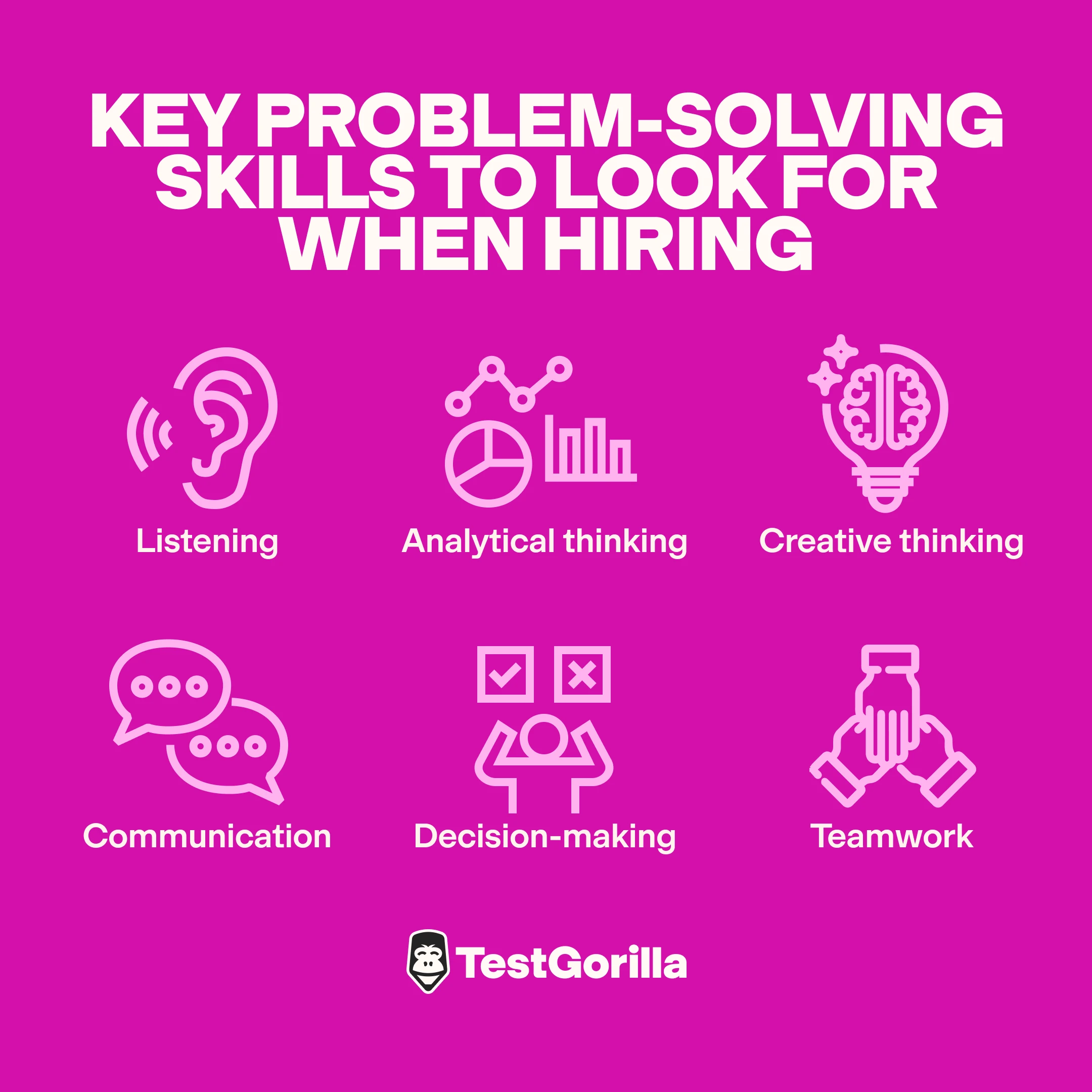
1. Listening skills
Active listeners are generally great problem solvers.
They can listen to those around them to gather the information needed to solve the problem at hand. They also recognize the importance of valuing others’ opinions and experiences to help understand why the problem occurred and define the best course of action to remedy it.
2. Analytical thinking skills
Analytical thinkers can identify the logical reasons why a problem occurred, what the long-term effects of the issue could be, and identify how effective different solutions might be to select the most practical one.
That’s why it’s essential to assess analytical thinking skills during recruitment.
3. Creative thinking skills
Creative thinkers can balance their analytical skills with creative approaches to challenges. Creative thinking skills enable individuals to uncover innovative and progressive solutions to problems.
In this way, they’re able to provide new perspectives and provide imaginative and experimental solutions to all kinds of problems.
4. Communication skills
Problem solvers should also possess great communication skills . The ability to effectively relay complex information thoroughly yet succinctly is a huge benefit for employers working in fast-paced environments.
5. Decision-making skills
Those with problem-solving skills will also possess the ability to make decisions and be confident in them. This is important, because most problem-solving involves making firm decisions to reach a successful outcome.
6. Teamwork
Although problem-solvers need to be independent thinkers, it’s also vital for them to work well as part of a team .
Determining the best solution often requires collaboration, so it’s important that candidates can demonstrate how they can motivate others to come up with the best solutions and work with them to help develop and implement solutions.
Problem-solving skills enable you to find candidates who are cognitively equipped to handle anything their jobs throw at them.
Problem solvers can observe, judge, and act quickly when difficulties arise when they inevitably do. Moreover, they are not afraid of the unknown, which is invaluable to employers who rely on their employees to identify and solve problems.
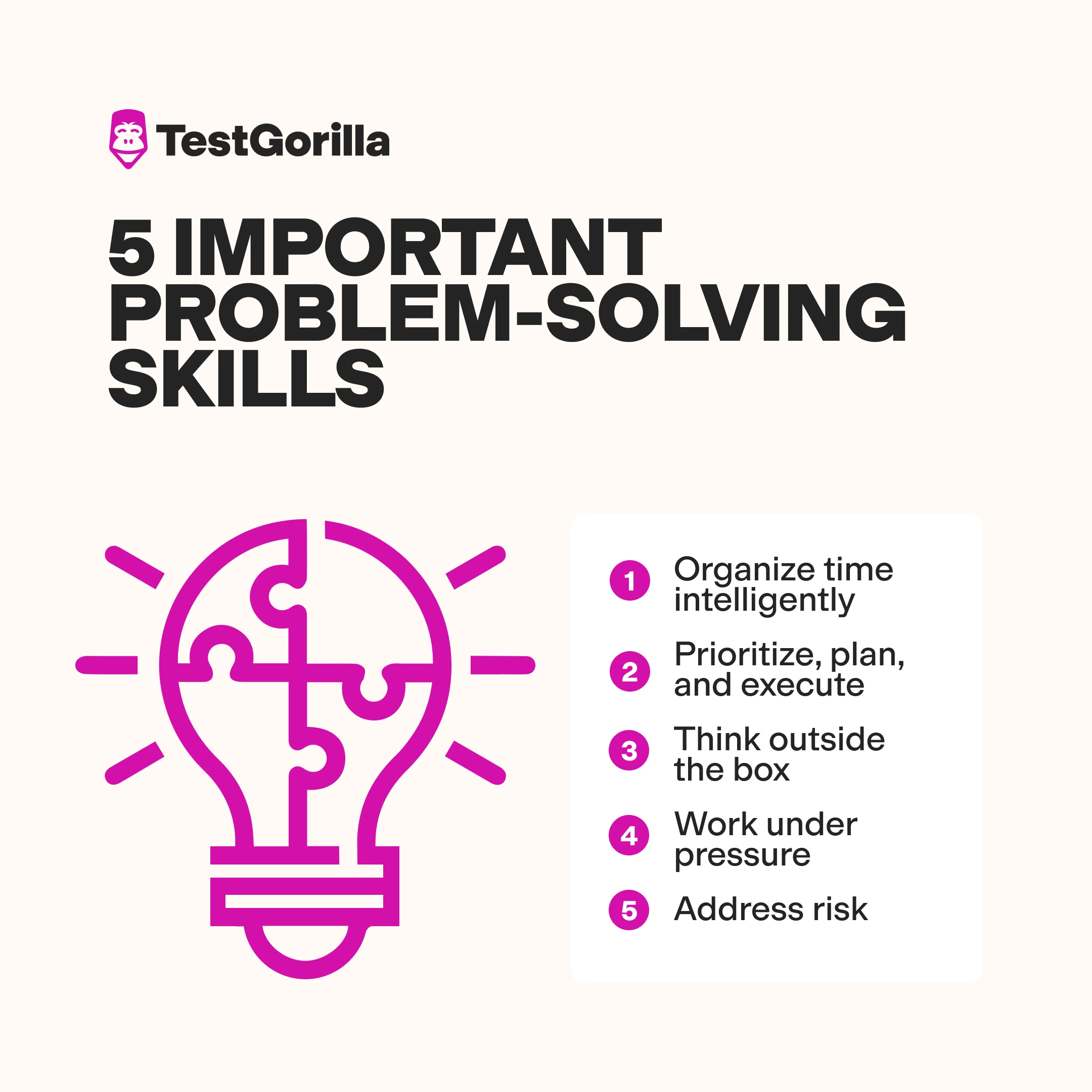
There are several important benefits of problem-solving skills in the workplace. Below, we’ll go through five of the most significant ones that all problem solvers can bring to their roles and workplaces:
1. Ability to organize their time intelligently
Time management skills can often be underlooked as one of the benefits of problem-solving skills in the workplace.
However, those with problem-solving abilities also typically possess stellar time-management skills. The ability to manage their time wisely and laser-focus on what’s important to the business will lead to better decision-making and business impact.
2. Ability to prioritize, plan, and execute strategies
Problem solvers have no issue with carefully assessing customer and business needs and deciding how to prioritize, plan, and execute strategies to meet them. They can manage all moving parts and strategize to meet multiple unique demands.
3. Ability to think outside the box
Problem solvers can often identify hidden opportunities in problems. Thinking outside of the box is an important problem-solving skill in the workplace, because it can often lead to better outcomes than the originally expected ones.
4. Ability to work under pressure
This is often one of the most important benefits of problem-solving skills in the workplace. Problem solvers often work well under pressure, for example when dealing with short deadlines and changing project requirements.
Depending on your workplace culture, you might prefer someone who can deliver quick solutions or someone who takes their time to identify the next steps. Both are valid and important problem solving qualities.
5. Ability to address risk
Planning is an important problem-solving skill. Problem solvers are not just equipped to deal with the problem at hand but are also able to anticipate problems that will arise in the future based on trends, patterns, experience, and current events.
Let’s now look at some specific examples of problems that could arise at the workplace – at any workplace, really – and how employees’ problem solving skills can help address each issue.
Below, you’ll find five typical scenarios where problem solving skills are essential.
Conflict between team members
Poor team dynamics or lack of a collaborative spirit might result in frequent workplace conflicts – especially within larger teams.
For example, members of cross-functional teams might disagree on the way they should address a particular issue or even on the priority they should give to it.
How problem solving skills can help:
Teamwork is essential when solving conflict – and a cornerstone of effective cross-functional team leadership .
For this, coworkers need to share a common understanding of the team’s goals and also be willing to work towards achieving them, even when they disagree on the specific approaches to each goal. The ability to understand others’ perspectives, analyze information critically, and come up with a few different solutions is key to finding a common ground and making progress on the team’s objectives.
Inefficient processes
Outdated, inefficient processes can reduce productivity and frustrate employees.
Multi-step approval processes are a typical example of this. Having multiple layers of approval for routine decisions can significantly slow down team progress and lead to missed opportunities.
Analytical thinking skills are key in identifying inefficiencies and building better procedures. Employees or team leads can build flowcharts that speed up decision making without having to ask a supervisor’s permission at every step of the process.
Book a free live demo with us and learn how quick and easy it is to create an online skills assessment

Poor communication can lead to misunderstandings and lack of clarity and direction – which, in turn, can be detrimental to team performance.
For example, if you’re a remote-first company, maintaining clear and effective remote communication can be challenging.
The over-reliance on emails and messaging apps might make it feel like teams are communicating effectively and are always connected. However, the lack of non-verbal cues and face-to-face interactions might make it more difficult to build rapport and a positive workplace culture .
Listening skills are essential to solving communication issues – and good listeners are often excellent at solving problems by recognizing, understanding, and acknowledging others’ points of view.
One-on-one meetings enable people to communicate more freely and effectively and solve challenges together, so consider encouraging team members to hop on a call each time they encounter a difficult challenge.
Additionally, you can help employees bond with each other with some remote team building activities to improve team cohesion. Plus, problem solving challenges can be excellent team building exercises.
Technological disruptions
New technologies often disrupt the usual ways of doing things – and sometimes, this can be disruptive for entire teams’ work.
For example, generative AI and automation technologies have revolutionized numerous types of work, including data analysis, marketing, customer service, and even content creation.
Creative thinking and cognitive flexibility are among the top 10 most important skills of the future , according to the World Economic Forum. Both are essential for adopting new technologies successfully – and finding ways to make the most out of each new tool to improve productivity.
Insufficient onboarding resources
Team members may struggle to do their best work if they haven't received proper training or resources.
For example, start-ups that experience rapid growth might hire a few employees at once – or even entire teams.
If they fail to allocate sufficient time and resources to onboarding new hires, this might lead to lost productivity, a lacking sense of belonging, or increased turnover. That’s true not only for junior employees but also for newly hired senior leaders , as the Harvard Business Review points out.
Your leadership team’s analytical and decision-making skills are crucial in enabling them to distribute limited resources in a way that would give their teams the best chances of success.
To build a solid onboarding process , you need leaders who are able to take ownership of it – and who have the right problem-solving skills.
Many organizations use problem-solving interview questions to identify the right candidates for their job openings. However, the most effective way to assess problem-solving skills is with pre-employment skills assessments .
That’s because skills tests provide an objective way to quantify a candidate’s problem-solving skills in a way that isn’t possible during an interview.
How problem solving skills tests work
Tests like TestGorilla’s problem-solving skills test assist organizations in finding candidates who are able to quickly identify the key elements of the problem and work through the problem at speed without making mistakes.
By presenting candidates with a wide range of questions related to typical problem-solving scenarios, hiring teams can rank their candidates based on an intensive assessment of each candidate’s skill level.
The test specifically evaluates whether a candidate can perform problem-solving tasks like:
Creating and adjust schedules
Prioritizing items based on a given set of rules
Interpreting data and applying logic to make decisions
Analyzing textual and numerical information to draw conclusions
As you can see, even the best interviewer would have trouble assessing each of these skill areas while still covering all the other questions that they need to ask.
If you’re convinced of the importance of problem-solving skills in the workplace and want to build a team of employees that can think independently and solve their own problems without constant supervision, assess problem-solving skills during the hiring process.
Problem-solving skills tests like ours are an excellent way to achieve this – especially if you combine them with other skills tests. Check out our extensive test library for other tests you can use in your talent assessment process to hire the best talent.
Sign up for our free plan to start building your first assessment – or schedule a demo with one of our experts to see how to evaluate applicants’ problem solving skills quickly, efficiently, and without bias.
Related posts

What to pay a software developer

Logistics coordinator job description template: Everything you need to include

16 essential work-related strengths to look for in the ideal candidate
You've scrolled this far
Why not try TestGorilla for free, and see what happens when you put skills first.

Latest posts

The best insights on HR and recruitment, delivered to your inbox.
Biweekly updates. No spam. Unsubscribe any time.
Skills tests to hire the best
Our screening tests identify the best candidates and make your hiring decisions faster, easier, and bias-free.
Free resources

A step-by-step blueprint that will help you maximize the benefits of skills-based hiring from faster time-to-hire to improved employee retention.

With our onboarding email templates, you'll reduce first-day jitters, boost confidence, and create a seamless experience for your new hires.

This handbook provides actionable insights, use cases, data, and tools to help you implement skills-based hiring for optimal success

A comprehensive guide packed with detailed strategies, timelines, and best practices — to help you build a seamless onboarding plan.

This in-depth guide includes tools, metrics, and a step-by-step plan for tracking and boosting your recruitment ROI.

Get all the essentials of HR in one place! This cheat sheet covers KPIs, roles, talent acquisition, compliance, performance management, and more to boost your HR expertise.

Onboarding employees can be a challenge. This checklist provides detailed best practices broken down by days, weeks, and months after joining.

Track all the critical calculations that contribute to your recruitment process and find out how to optimize them with this cheat sheet.
We are offering inhouse programs to upskill your entire organization

The Importance of Problem-Solving Skills in the Workplace
November 10, 2022 - job & career, discover your own management 3.0 path: answer a few questions to get personalized recommendations.
Tell us a bit about yourself, and we’ll tailor our recommendations to match your interests. Just answer a few quick questions below to get started!
Our Recommendation Based on Your Answers
Build upon the foundation of your knowledge by delving deeper into the main principles and practices of Agile Leadership with our Agile Change Leadership Workshop .
Build upon the foundation of your knowledge by delving deeper into the main principles and practices of Agile Leadership with our Agile Co-Creation Leadership Workshop .
Build upon the foundation of your knowledge by delving deeper into the main principles and practices of Agile Leadership with our Agile Team Leadership Workshop .
Build upon the foundation of your knowledge by delving deeper into the main principles and practices of Agile Leadership with our Agile People Leadership Workshop .
If you are interested in other options we offer, please check our Learning Path .
The Foundation Workshop is where your Management 3.0 learning journey truly begins, and you will learn about the principles, pillars and popular practices you can use right away.
The Foundation Workshop is where your Management 3.0 learning journey truly begins, and you will learn about the principles, pillars and popular practices you can use right away. If you are interested in other options we offer, please check our Learning Path .
Agility in HR Workshop by Management 3.0 is the popular Management 3.0 Foundation Workshop with additional content and ICAgile accreditation targeted for people who work in or closely with human resources.
With our global team, we provide tailor-made programs to enhance mindsets and skills for entire organizations, ensuring your business is future-ready! Learn more about our Inhouse Training Programs .
Our Company License gives your learning team, transformation staff and leaders the ability to facilitate the Management 3.0 mindset, practices and official workshops yourselves.
You sound like a match for our global Facilitator community! Get your Management 3.0 Facilitator License now !
We have defined certain requirements that you must meet to become a licensed Management 3.0 Facilitator. We offer both workshop-based and practice-based approaches. Read more about the requirements .
In the Official Management 3.0 Community you can connect with curious and focused like-minded leaders from all over the world to practice, share, and grow!
Our practical, hands on and tangible tools and management games are the best way to foster transformational change within teams, companies and even on a personal level.
According to Management 3.0 Facilitator Ilija Popjanev , problem solving is essential for individuals and organizations as it enables us to control all aspects of our business environment. In this article, Ilija looks into problem-solving skills, how the problem-solving process works, and which tools help you to advance this skill set.
In this article you will learn about:
What is Problem Solving?
- Problem-Solving in Six Easy Steps
Why is Problem-Solving so Important for Leaders, Teams, and Organizations?
Problem-solving techniques in the workplace, better employee experience by using problem-solving tools from management 3.0, how do employees develop problem-solving skills, what skills make a good problem solver.
In the last few years, we have been living 100% in the VUCA world, with so many unpredictable and complex threats and challenges. As a result, organizations must create a sense of urgency to redesign their present business models and to rebuild the foundations for the future of work.
All companies now need effective problem-solving skills and tools at all levels, starting with individuals and teams, and finishing with their leaders and managers. This new reality enables growth and success only for those well-equipped and empowered by effective problem-solving skills and tools.
One of the behaviors of Management 1.0 style is to constantly look for ways to stop “fighting fires,”. Instead, the Management 3.0 style seeks to “find the root cause” of the problem, and then to refocus, improve, and plan a different way for fulfilling workplace tasks.
Management 3.0 provides effective tools and principles for building the system for effective problem solving. It provides us with techniques we can use to understand what is happening in our world, to identify things we want to change, and then apply everything that needs to be done to achieve the desired outcome. We live by the motto: fail fast, recover quickly, and learn from the failures.
The agile way of working does not mean being perfect, but instead it allows for failures and sees them as opportunities to learn, grow, and adapt . Perfection is useless if we do not provide value fast for our customers. That is why problem solving is the foundation for continuous improvement, learning, and collaboration, which leads to innovations and success in ever-changing economies and the new normal that we now live in.
The definition of problem solving according to the Merriam-Webster Dictionary is: “The process or act of finding a solution to a problem.” Similarly, the Oxford English Dictionary describes problem solving as: “The process of finding solutions to difficult or complex issues.”
For me, Problem-solving is a process of understanding and owning the problem, constant pursuit for solutions and improvements, and putting into action the best option for the desired outcome.
Understanding context and interacting with our teammates are the essence of effective problem-solving. We must clearly understand the complexity of our environment and the specifics of the context because things continuously change and evolve. Here, the Complexity Thinking Guidelines may help you to better understand what is happening and how to navigate complex environments more effectively.
We must have a lens through which to see problems as opportunities to improve, and regard our teams as sources of knowledge and experience. We have to connect people and opportunities in ways that can facilitate the best solutions for the problems that we are handling. Try using the Personal Maps , an excellent tool for bringing teams together and fostering diversity, respect, trust, and collaboration.
Today, all innovations and solved problems are team efforts because teams constantly improve their toolbox and competencies. Teams want to create something that was not there before, and which maximize their knowledge and resources.
To accomplish that, they need to build a process in a few easy steps:
- Be present, observe what is happening in your world, and define the problem.
- Review where you are now and what influences that state.
- Constantly improve and change things by using creative tools and tactics.
- Seek solutions and alternatives to make changes more effective.
- Make team decisions about which tools and solutions should be used.
- Implement improvements, monitor the process, and constantly adapt!
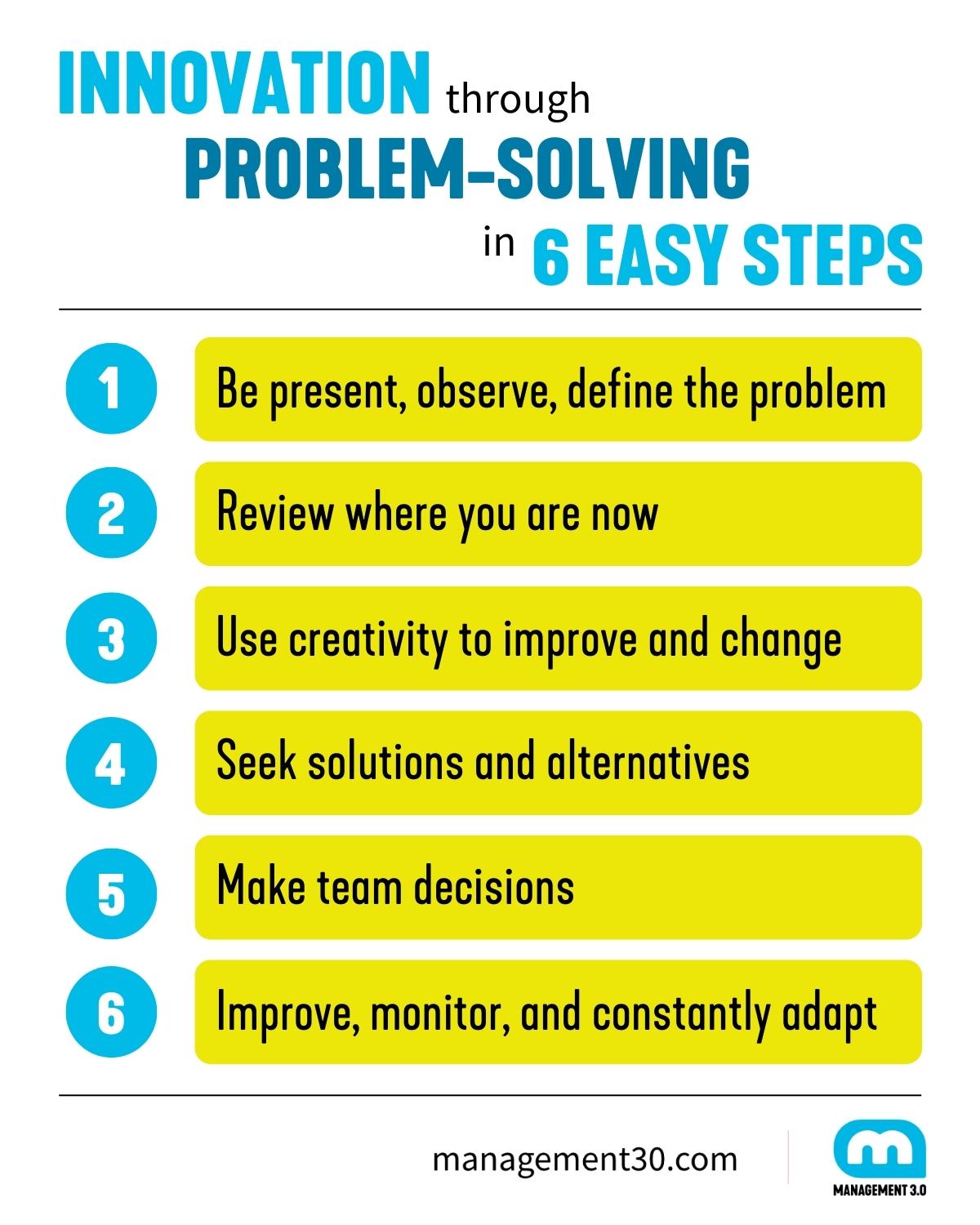
At this stage, by following the Management 3.0 principle of “Improving the system,” you can use the tools Celebration Grids , combined with Yay! Questions , to best engage the team in the problem-solving process, while keeping track of what is working well, what can be changed, and what new options exist.
Documenting everything is an integral part of the problem-solving process. By using Celebration Grids, you are gamifying the process and keeping the team flow and energy on a higher level.
Also read: What type of problem-solver are you?
Problem-solving is crucial for everyone: individuals, teams, leaders, organizations, and ultimately for all stakeholders because it empowers us to better control the environment and everything that is going on in our world. Try using Delegation Poker so that teams can become more empowered to solve problems both alongside leaders and within their organization.
Today, the speed of problem solving is important, and that is why organizations must give more power and authority on a team level , so employees can react quickly and even prevent problems. As a leading indicator, the Management 3.0 tool Problem Time can help you measure the time spent on uncompleted problem-solving tasks and activities; this is a valuable add-on to “lead and cycle time” lagging indicators, with which you measure the time taken on completed tasks.
Developing and refining problem-solving skills through constant practice and experimentation can refine the ability to solve problems and address issues with more complexities.
We may face various challenges in our daily work, and effective problem-solving can make a difference.
Make a Difference with Problem-Solving
- Problem-solving skills are important if you want to add more value . As an agilist, your objective is not to be perfect but to maximize the value you provide for all stakeholders. Start fast, deliver value early, manage failures and prioritize tasks by setting the urgency criteria.
- Problem-solving skills are important if you need to improve your results. You have to accept the complexity of success factors and better understand the need for changes and improvements in a continually uncertain environment. Results depend on your problem-solving skills!
- Problem-solving skills are important if you have to fix things that do not work. When your processes are not working as planned, problem solving will give you the structure and mechanisms to identify issues, figure out why things are broken, and take actions to fix them.
- Problem-solving skills are important when you have to address a risk. Sharpen your problem-solving skills to anticipate future events better and increase the awareness of cause-and-effect relationships. This enables you to take the right actions and influence the outcomes if issues do occur.
- Problem-solving skills are important if you work simultaneously on several projects. You should apply the same problem-solving techniques when you work on multiple projects, business functions, market segments, services, systems, processes, and teams. Standardize and scale!
- Problem-solving skills are important when you want to seize the day. Problem solving is all about innovation , building new things, and changing the system into a better one. This can help us to identify opportunities even in challenging times and prepare us for the future. You can visualize the process with the Meddles Game to better understand your ideas, solutions, and activities. It is a great way to engage your team as you can build the problem-solving concept and it is an effective tool for influencing all stakeholders affected by the problem.
Also read: Collaborative Leadership explained .
Solving complex problems may be difficult, but problems will be solved when we use the right tools. Besides the powerful Management 3.0 tools I already mentioned, as a big fan of Lean and Liberating structures, I think you can find lots of problem-solving techniques to use in your daily business.
Here is my short list of tools and techniques:
- 5 Whys – a great way to uncover the root cause is to understand the problem better.
- Fishbone analysis – for visual analysis of the root causes of a problem. Easy to combine with ‘5 Whys’ or ‘Mind mapping’ to brainstorm and determine the cause and effect of any problem.
- Silent brainstorming – gives everyone a chance to participate in idea generation as not only the loudest people, but also the quiet ones, will participate equally. Everyone’s opinion has the same weight.
- Mind maps – structured visual diagrams to share your ideas, concepts, and solutions the same way your brain does. You explain the problems quickly, then share fresh ideas, and finally come to a team consensus that can lead to an effective solution.
- Six thinking hats – enable your team to consider problems from different angles, focusing on facts, creative solutions, or why some solutions might not work.
- Agreement certainty matrix – another tremendous visual tool for brainstorming problems and challenges by sorting them into simple, complicated, complex, or chaotic domains to later agree on what approach should be used to solve the concrete problems affecting a team.
- Conversation café – enables the team to engage in productive conversations, with less arguing but more active listening, solving the problem in rounds of dialogues until reaching a consensus regarding the best problem-solving approach.
- Design thinking – when you are struggling for fresh ideas, the 5-step process will help you empathize with the problem, then begin defining and developing new ideas, before prototyping and testing them.
Edward Deming’s PDCA is the most known concept for continuous improvement and problem solving. You can gamify your events using the Change Management Game , a card game where PDCA will help you define the problem, take action, collect feedback, and adopt the new solution.
The “carrot and stick” approach, or in HR language, “pay for performance,” does not work anymore, especially for roles that require problem-solving, creativity, and innovative thinking. Creative people need a higher level of authority and empowerment to self-manage challenges and problem scenarios. When leaders and organizations create such systems, they foster intrinsic motivation and job satisfaction among these people. Creatives are seeking self-actualization through their careers.
This is one more case which calls for Management 3.0’s Delegation Poker to define the levels of authority in terms of problem-solving issues, as well as Moving Motivators to define key motivators for increasing productivity and employee satisfaction by changing behavior.
Improving Employee Experience with Problem-Solving
1. Use problem solving as a key motivator – have in mind Millennials and Gen Z creative workers ’ affinity towards tasks in which they feel challenged and have a sense of meaning. Provide them with big and tough problems to solve and use challenging tasks to keep them constantly engaged.
2. Continuous improvement can make a difference – creatives seek a sense of purpose and think outside of the box, so encouraging the ‘How can we execute this task better?’ mindset and problem solving become powerful tools for creating sustainable corporate culture.
3. Don’t connect solving problems with rewards – it can kill the perceived intrinsic value of the activity; it will disengage and dissatisfy employees. Autonomy, trust, respect, and gratitude will do the job.
4. Apply the seven rules for creative managers – unleash the power of diversity , and cooperation, rely on merits, optimize exploration, open boundaries, keep options open, and update your workplace.
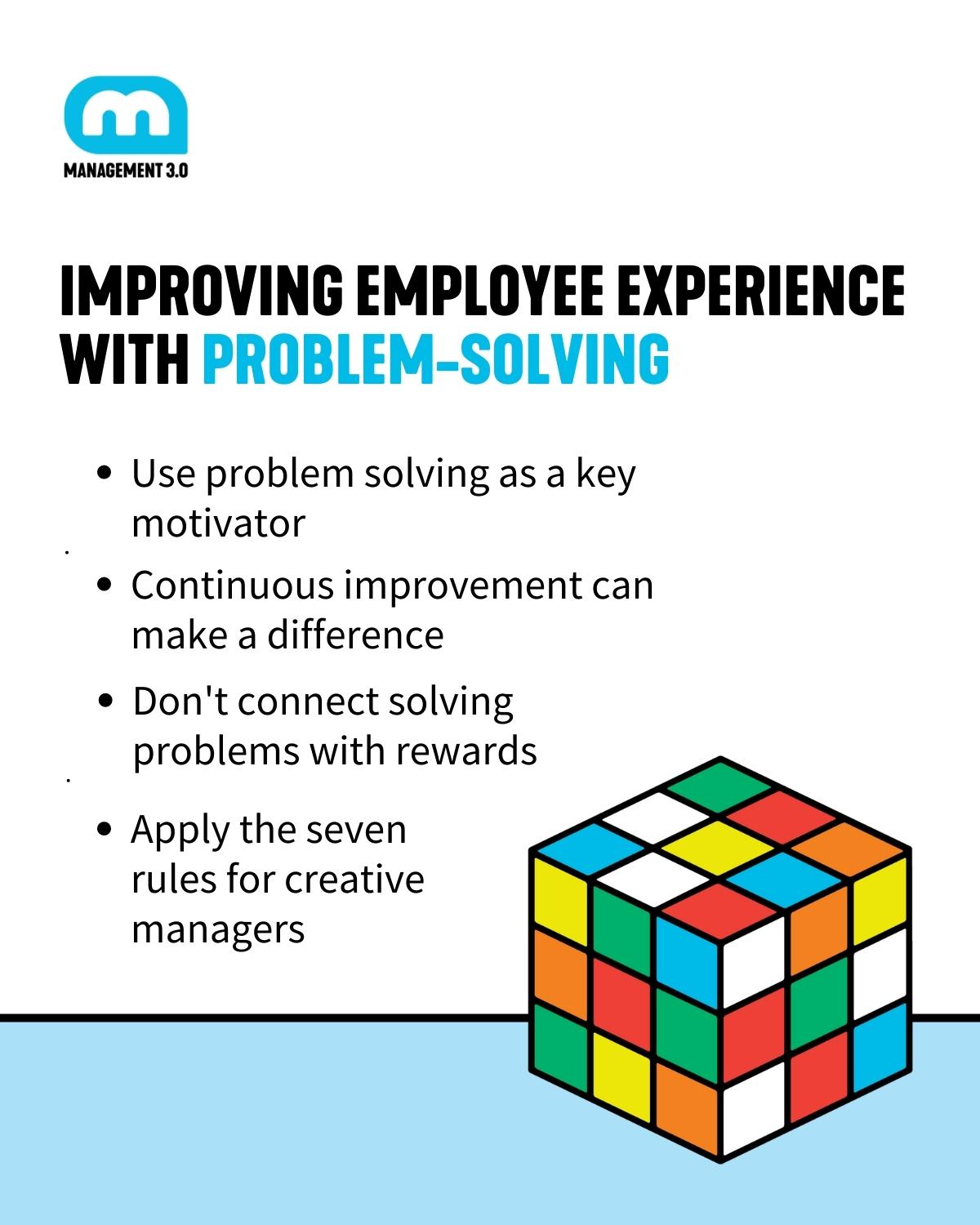
We start solving problems from a very early age (the alphabet, learning to eat, driving a bicycle etc.). Then, everyday activities sharpen our problem-solving skills and enable us to solve more complex issues.
As an adult, you can still develop your problem-solving skills by:
- Daily practicing of logic games, such as chess, and puzzles like Sudoku.
- Video games can teach you how to deal with failure and persist in achieving your goals.
- Keep an idea journal or blog as a collection of all your ideas, thoughts, and patterns.
- Think outside of the box – take a different perspective to understand the problem better.
- Practice brainstorming combined with mind mapping, working with your team.
- Put yourself in new situations – take on a challenging project at work.
- Start using the “what if” mindset in daily circumstances and test new approaches.
- Read more books on creativity and articles which cover your areas of interest.
I also believe coaching can help build creativity and problem-solving skills, encouraging people to take greater ownership of their work and commit to corporate goals. A coach can provide clear guidance as to what is important at the moment; they help people better, focus, and move into action. By asking powerful questions and challenging others to think outside of the box, the coach removes their barriers and lets them see the situation from a new perspective.
Coaching can provide structure so people develop their own expertise and insights to contribute better when problems arise and the pressure to succeed is growing.
The interview is an excellent opportunity to research a candidate’s problem-solving skills, and STAR questions should be related to their previous experience dealing with problems. A candidate with good problem-solving skills can quickly embed in the team and become a valuable asset for the company.
In my Agility in HR workshops , we regularly discuss interview questions. Some popular STAR questions are:
- “If you cannot find a solution to a problem, how do you deal with the situation?”
- “How do you react when faced with unexpected problems or challenges?”
- “Describe an occasion when you had to adapt at the last minute. How did you handle this?”
Problem-solving requires the ability to identify a problem, find the root cause, create solutions, and execute them. All these steps are essential for achieving the desired results.
Some of the skills that problem solvers must constantly sharpen are:
- Collaborative communication . Clear communication is essential when you explain the problem and the solution to your teammates. During brainstorming sessions, asking the right questions to determine the root cause , as well as synergic collaboration are needed.
- Active listening is important to prevent mistakes as you can absorb the details your colleagues tell you about the problem. Use open-ended questions for clarification, and always be open to feedback and views that differ from yours.
- Coachability. The willingness to accept feedback and the ability to improve. Learning from more experienced people, being curious to ask many questions, constructively using your ego, skipping excuses and blaming others, and accepting Feedback Wraps from your coach.
- Decision making . Problems cannot be solved without risk-taking and bringing important decisions (including relevant data, levels of delegation, alternative solutions etc.) to the forefront.
- Critical thinking . Be 100% objective when you try to find the cause of the problem. Skip ego trips and personal biases. Identify your mistakes in the thinking process and show personal accountability .
- Research and data analysis . Proper research allows you to diagnose the actual problem, not just the symptoms. If the cause of the problem is not immediately apparent, you can use the power of data to discover the issue’s history, some patterns, future trends, etc.
- Persistence . Trust in the problem-solving process you have designed and follow every step with patience and persistence; even when you fail repeatedly, do not give up. Keep moving and remember Thomas Edison’s quote: “I have not failed. I have just found 9,999 ways that do not work.”
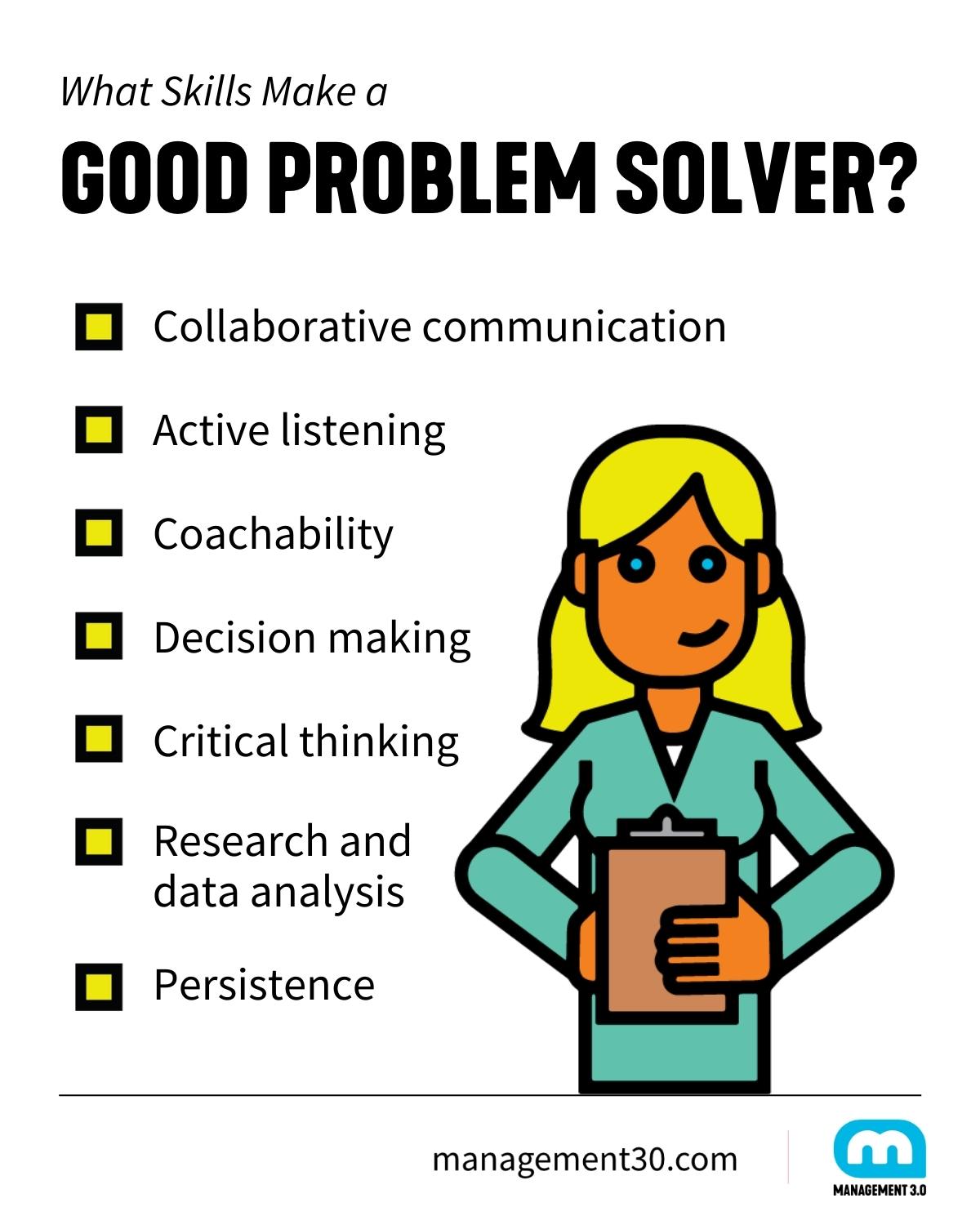
In the new VUCA world we now live in, problem solving is a crucial soft skill, and employers are actively seeking people with this skill set because they can prepare for problems before they arise. Problem solvers better identify opportunities, understand their environment, create a solution, and generate ideas that lead to great results and success.
According to a study made by LinkedIn Learning in August 2022 , future skills are rapidly changing, and problem solving is among the top soft skills employers search for from their candidates, as well as communication and leadership skills .
Using all aforementioned tools and practices from Management 3.0, following the guides, and sharpening your skills, will help you not only to be effective in resolving the problems that may arise, but also to solve them with enthusiasm and passion. They will create a higher level of engagement and collaboration in the team and help unleash people’s creativity and innovation. A win-win for everyone!
Photo by Parabol on Unsplash
Have you already read these?
Common career change mistakes to avoid, six signs you should change your job, why the tide of turnover is coming & what employers can do to prepare, the top 5 most in-demand soft skills, privacy overview, sign up for our engaging newsletter.

Subscribe Here!
Wait a second!
Buy Meddlers Game
Buy Kudo Cards
Buy Change Management Game
Buy Moving Motivators Game
Buy Delegation Poker Cards

IMAGES
VIDEO